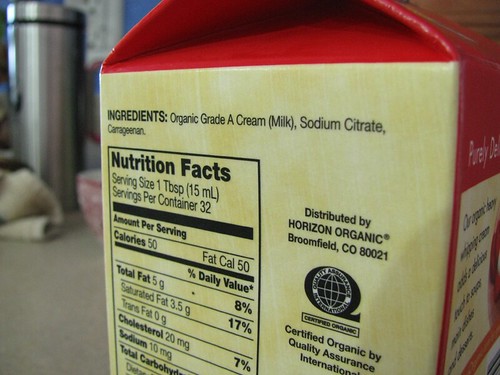I was disappointed to see that the organic heavy cream we buy isn't just cream any more. Yeah, before, there was one ingredient. Cream. Like it should be. Now there are three, Organic Grade A Cream (Milk), Sodium Citrate, Carrageenan. Carrageenan is used to thicken foods. Basically without it, the cream in this container wouldn't have the consistency of cream, because there's not enough cream in it to qualify as being heavy cream. It saves the manufacturer money. And you get not cream, but cream with some other crap thrown in. This is brilliant, from a marketing standpoint.

Sodium Citrate is probably used in this instance as a preservative. As if real cream needs a preservative! Pure cream shouldn't really need a preservative, if it's kept sealed and refrigerated. At the dairy where we get our raw milk, the dairy farmer told us that if we leave the cream on the milk would last maybe three weeks, whereas if we take the cream off, the skim milk left behind will go rancid in a few days. So what does Sodium Citrate being in the ingredient list tell us? It tells us the same thing as having the Carrageenan in it. There's not a lot of real cream in the container.
We're going to quit wasting money on this "organic" crap and get some real heavy cream from a local dairy. The amusing thing is, it's pretty much the same price as the product above.
The whole "organic" food movement is merely a money-maker and Big Agra is getting in on the game. It doesn't urge people to buy locally. They buy things labeled "organic" and think, firstly that the item is good for their health, based on the organic label alone, and secondly that they're doing something good for the environment. On the first part, if you're buying organic french fries, or organic waffles, those are no better for your body than non-organic ones. As for the environment, that's more codswallop. A truck had to bring your groceries probably at least half way across the country, and maybe an airplane had to bring it to the country in the first place. Do you know how much diesel a single truck uses in a day? I do, because I used to drive a tractor trailer. I would typically go through 100 gallons of diesel a day, driving for about 600 miles. That's a single truck.
Consider this article from Business Week:
Next time you're in the supermarket, stop and take a look at Stonyfield Farm yogurt. With its contented cow and green fields, the yellow container evokes a bucolic existence, telegraphing what we've come to expect from organic food: pure, pesticide-free, locally produced ingredients grown on a small family farm.
So it may come as a surprise that Stonyfield's organic farm is long gone. Its main facility is a state-of-the-art industrial plant just off the airport strip in Londonderry, N.H., where it handles milk from other farms. And consider this: Sometime soon a portion of the milk used to make that organic yogurt may be taken from a chemical-free cow in New Zealand, powdered, and then shipped to the U.S. True, Stonyfield still cleaves to its organic heritage. For Chairman and CEO Gary Hirshberg, though, shipping milk powder 9,000 miles across the planet is the price you pay to conquer the supermarket dairy aisle. "It would be great to get all of our food within a 10-mile radius of our house," he says. "But once you're in organic, you have to source globally."
So next time you pick up your "organic" crap at the store, ask yourself how far away it came from, and whether you could get the same thing closer to home, whether it's labeled "organic" or not. Organic certification doesn't mean jack, especially with Big Agra writing all the rules, and local farmers, although their food may be technically organic because they don't use pesticides, may not have the resources, the time, or the interest in getting certification. Buy locally, and ask the farmer how he operates.

interesting!
ReplyDelete